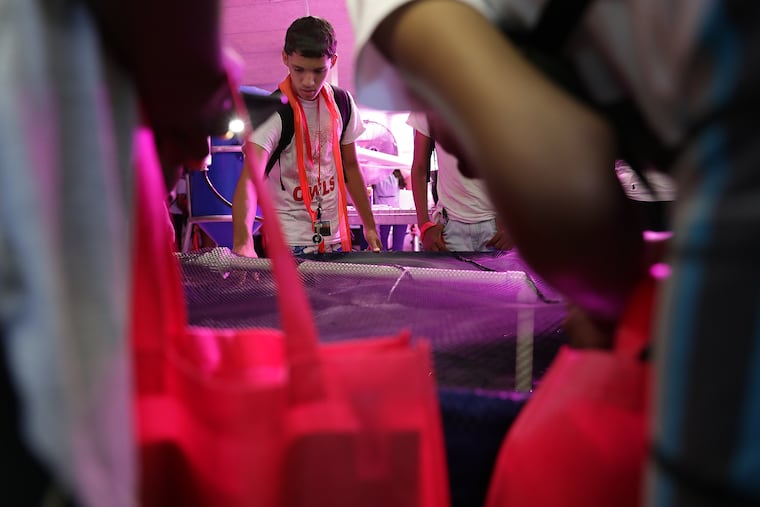How do the most vulnerable Philly teens get to college? This program helps them reach higher.
Temple University’s College Bound Academy immerses Philadelphia high schoolers who are either homeless or involved in the foster-care system in the college experience, exposing them to information about possible career paths and academic majors.

Carlos Torres recently was homeless. His mother has cancer, and his sister has autism; the 15-year-old knows the weight of worry very well.
So, when Torres was offered the chance to spend a week this summer living on a college campus, taking college classes, living in a dorm room, and picturing the possibilities of a future that looks very different from his life now, he grabbed it with both hands.
“I saw this as an opportunity to leave my predicament behind,” said Torres. “This could be a way out for me.”
Torres was part of Temple University’s College Bound Academy, a program for Philadelphia high school students who are either homeless or involved in the foster care system. It’s designed to immerse them in the college experience, exposing them to information about possible career paths and academic majors they might otherwise have a tough time accessing.
The program is five years old; this year, for the first time, the Philadelphia School District funded it, spending $58,215 for 30 public school students to have the weeklong summer experience. Some participants are strong students and some struggle in school, but each has the potential to push past hardships.
Colleen Landy, the School District’s assistant director of education for children and youth experiencing homelessness, said the funds go a long way. In general, homeless youth and those who have been involved in the foster care system have lower high school graduation and college entrance rates than their peers.
“Our kids are extremely resilient; however, they have been through so much,” Landy said. “We want them to understand that college is an option for them if they want it to be.”
That’s why Torres, a student at Philadelphia Military Academy, a public school in North Philadelphia, found himself in a Temple computer lab on Wednesday listening to professor Rose McGinnis tell him about jobs dealing with coding and computer science.
Then the high school students tried it themselves, figuring out the commands to make their character jump and sink a basket. It was just one of multiple classes the group took part in: sessions on careers in neuroscience and media, exposure to fencing and lacrosse. They toured Thaddeus Stevens College of Technology in Lancaster, completed team-building exercises, and peered at plants and an aquaponics lab at Temple University Ambler.
Torres had previously thought about college in the abstract: It was probably something he should do, but the details were hazy.
His future feels in much sharper focus now, said Torres, who now thinks he may want to study communications and eventually earn an MBA.
“Being in these classes, it gives me the sense that I can do this,” he said. “It’s an opportunity for kids like us, who’ve been through things, to look on the bright side.”
Living with a roommate didn’t faze him, Torres said. And the cafeteria food?
“It’s all you can eat,” he said, smiling. “Food is food — it’s better than not having anything.”
Jade Upshaw just completed her second College Bound Academy summer. Upshaw, 17, a rising senior at Philadelphia High School for Girls, found out about the program through the Achieving Independence Center, a program to help current and former foster students build skills. She hasn’t looked back.
“This gives me a little taste of what real life can be like,” said Upshaw.
After the computer science session, the students boarded a bus and headed north to Temple’s Ambler campus, where Angela Davis, campus director of development, encouraged the group to reach high.
“Going to college and being successful is sometimes not a straight and easy path,” Davis said. “There are going to be bumps in the road, but you can get around them and do amazing things.”
Davis told them her own story of perseverance: A North Philly kid from a family of six children who often did not have enough to eat, Davis worked her way through Temple because that was the only way she was going to get through college. It took her 7½ years to graduate, her studies interrupted by a car crash so serious she couldn’t work or walk for a time.
Use that story as an example of one way forward, Davis told the students. There are people who will help, not just financially, but with time and expertise. Find them, and take them up on their offers.
“If you are really committed to being successful, then you can get it done,” said Davis. “A college degree is life-changing. Because of mine, my life is very different from the way I grew up.”
For some students, the week shifted their perceptions of the future. Anaya Mackins, a rising senior at Roxborough High School, wanted to enter the Air Force after graduation. She knew that joining the military meant steady work and a sense of purpose.
That hasn’t changed, Mackins said, but spending a week on a college campus shifted things. After sitting through a presentation on neuroscience, Mackins now sees herself using her military benefits to earn a degree someday.
“The minute I got in that neuroscience class, I thought, ‘This is for me,’” Mackins said. “This week just expanded my horizons.”
The Philadelphia Inquirer is one of 21 news organizations producing Broke in Philly, a collaborative reporting project on solutions to poverty and the city’s push toward economic justice. See all of our reporting at brokeinphilly.org.